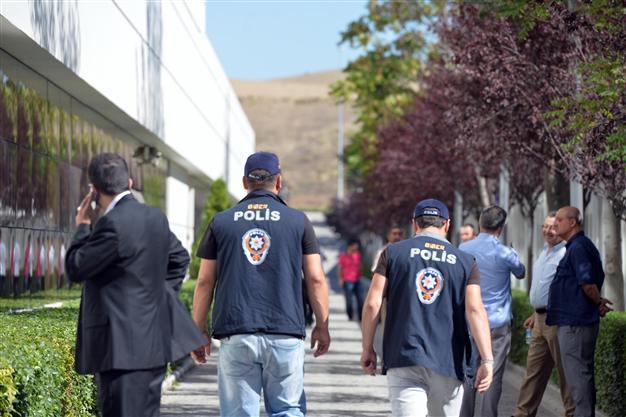Turkish police raid Gülen-linked Koza İpek companies
ANKARA

DHA photo
Turkish police have raided companies in Ankara belonging to Koza İpek, a corporation linked to the government’s ally-turned-nemesis Fethullah Gülen, raising concerns about freedom of the press.State-run Anadolu Agency reported on Sept. 1 that the raid targeted 23 companies of the corporation over what it noted as “giving financial support to the Fetullahist Terror Organization (FETÖ) and conducting its propaganda.”
The conglomerate's chairman, Akın İpek, was not among the six people who were detained because he left Turkey a couple of days ago, according to the report, which also said police had seized documents and computers found at the companies.
The raid led by Turkey’s Financial Crime Investigation Board (MASAK) was launched at around 8 a.m. and was first reported by Kanaltürk and Bugün television stations, two media outlets owned by the corporation, according to Turkish media.
Although there had not been a police raid on İpek's media outlets by noon, the Aug. 31 ruling of the magistrate lists the Ankara offices of Kanaltürk and Bugün among the addresses to be raided, Turkish media added.
In a statement, the Turkish Journalists' Association (TGC) condemned the raid, emphasizing that "journalists cannot be silenced."
A police search has also been launched at İpek University, as well as Akın İpek’s house in Ankara.
The Koza İpek Corporation is active in the media, energy and mining sectors.
Claims on social media
Relations between the Justice and Development Party (AKP) government and its former ally, U.S.-based Islamic cleric Gülen, soured after massive corruption investigations in December 2013 that implicated several government figures.
The government described the investigations as a coup attempt launched by Gülenists working within the security and judiciary institutions. The move was followed with a massive reshuffling in the bureaucracy, criminal investigations and ultimately the declaration of the Gülenist movement as a terrorist organization.
A well-known social media whistleblower nicknamed Fuat Avni, who is thought to have close links to the Gülen movement while still sustaining information channels with the top echelons of the government, recently claimed on Twitter that the administration was “planning an operation to silence critical media” before the Nov. 1 election.
Akın İpek said in a written statement on Aug. 31 that the corporation's 27 companies had been under financial inspection for the past two years. "Our group cannot be part of a crime scenario even if it is fictional," he said, vowing to "disprove the slander with documents."
'Silencing media'
Stocks of the corporation's energy and gold mining companies dove more than 10 percent on the Istanbul Stock Exchange in the immediate aftermath of the police operation.
“Here are two newspapers from Turkey ahead of elections. Even if you silence all newspapers, you can’t hide the truth,” Cumhuriyet editor-in-chief Can Dündar said in a tweet after the police raid.
Seçime giden Türkiye'den iki gazete...
Tüm gazeteleri sustursanız, gerçeği gizleyemezsiniz. pic.twitter.com/L7RP0736u3
— Can Dündar (@candundaradasi) September 1, 2015Dündar, a center-left journalist, documentary producer and known opponent of Gülen’s Hizmet movement, had drawn the ire of Erdoğan when his newspaper published visual material on May 29 about the military content of a convoy of trucks sent by the National Intelligence Organization (MİT) to Syria in January 2014.
An investigation was launched into the publication and Erdoğan had applied to prosecutors, demanding up to two life terms in prison against Dündar.
















